
Foster's Lager is an internationally distributed brand of lager. It is owned by the international brewing group Asahi Group Holdings, and is brewed under licence in a number of countries, including its biggest market, the UK, where the European rights to the brand are owned by Heineken International.

The Joseph Schlitz Brewing Company was an American brewery based in Milwaukee, Wisconsin, and once the largest producer of beer in the United States. Its namesake beer, Schlitz, was known as "The beer that made Milwaukee famous" and was advertised with the slogan "When you're out of Schlitz, you're out of beer". Schlitz first became the largest beer producer in the US in 1902 and enjoyed that status at several points during the first half of the 20th century, exchanging the title with Anheuser-Busch multiple times during the 1950s.

Holsten Brewery is a brewing company founded in 1879 in what is now Hamburg's Altona-Nord quarter. The group now has seven breweries in Germany. Its nationally distributed premium brand is the pale lager Holsten Pilsener. The company was acquired by the Carlsberg Group in 2004.

Tennent Caledonian is a brewery based in Glasgow, Scotland. The Wellpark Brewery is situated in the city's East End, between the Townhead and Dennistoun districts along Duke Street.
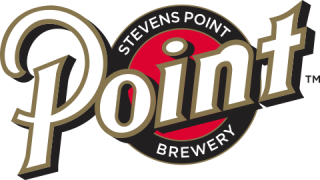
Stevens Point Brewery is a regional American brewery located in Stevens Point, Wisconsin. The brewery is the fifth-oldest continuously operating brewery and the third-oldest privately owned brewery in the nation.
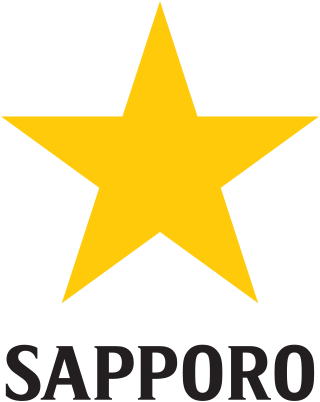
Sapporo Breweries Ltd. is a Japanese beer brewing company founded in 1876. Sapporo is the oldest brand of beer in Japan. It was first brewed in Sapporo, Hokkaido, Japan, in 1876 by brewer Seibei Nakagawa. The world headquarters of Sapporo Breweries is in Ebisu, Shibuya, Tokyo. The company purchased the Canadian company Sleeman Breweries in 2006.
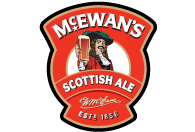
McEwan's is a brand of beer owned by Carlsberg Marston's Brewing Company. It was originally brewed by William McEwan's Fountain Brewery in Edinburgh, Scotland. The McEwan's brand passed to Heineken in 2008 after their purchase of Scottish & Newcastle's British operations. Heineken sold the brand to Wells & Young's in 2011, who sold their brewing operation, including the McEwan brand to Marston's in 2017. Cans and bottles are now brewed in Bedford, England.

Castle Lager is a South African pale lager. It is the flagship product of South African Breweries and has been recognised as the National Beer of South Africa, based on the fact that it is 100% grown and produced in the country, and for its ability to unite the community behind a common cause.
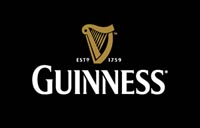
St. James's Gate Brewery is a brewery founded in 1759 in Dublin, Ireland, by Arthur Guinness. The company is now a part of Diageo, a company formed from the merger of Guinness and Grand Metropolitan in 1997. The main product of the brewery is Draught Guinness.

Grupo Modelo is a large brewery in Mexico that exports beer to most countries of the world. Its export brands include Corona, Modelo, and Pacífico. Grupo Modelo also brews brands that are intended solely for the domestic Mexican market and has exclusive rights in Mexico for the import and distribution of beer produced by Anheuser-Busch. Until the 1960s, Grupo Modelo used red poppy flowers in most of its advertising.

Harp Lager is an Irish lager created in 1959. Formerly produced at the Great Northern Brewery in Dundalk, it is now brewed in Dublin. It is a major lager brand throughout most of Northern Ireland, but is now rarely available in the Republic of Ireland.

Beer is the most popular alcoholic drink in New Zealand, accounting for 63% of available alcohol for sale. At around 64.7 litres per person per annum, New Zealand is ranked 27th in global beer consumption per capita. The vast majority of beer produced in New Zealand is a type of lager, either pale or amber in colour, and typically 4–5% alcohol by volume.
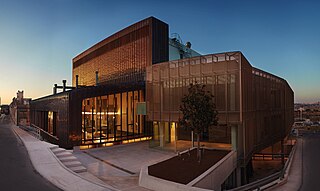
Simonds Farsons Cisk plc, commonly known as Farsons, is a Maltese food and beverage conglomerate whose businesses include brewing, sale and distribution of beer and soft drinks; importation, wholesale and retail of food and beverages; operation of franchised food retailers; and property development.
Plzeňský Prazdroj, a. s., known in English as the Pilsner Urquell Brewery, is a Czech brewery opened in 1842 and headquartered in Plzeň, Czech Republic. It was the first brewery to produce pale lager, branded as Pilsner Urquell, which became so popular and was so much copied that more than two-thirds of the beer produced in the world today is pale lager, sometimes named pils, pilsner and pilsener after Pilsner Urquell. The brewery name, Pilsner Urquell, which can be roughly translated into English as "the original source at Pilsen", was adopted as a trademark in 1898. Pilsner Urquell is the largest producer and exporter of beer in the Czech Republic.

Lion Brewery, Inc, is the operator of the Lion Brewery, located in Wilkes-Barre, Pennsylvania, which was founded in 1905. A "heritage brewery", it is one of only 10 United States pre-Prohibition breweries that has independently and continuously operated since the repeal of Prohibition. It produces beers under its own Lionshead brand, and contract brews beer for other companies.

The Valentin Blatz Brewing Company was an American brewery based in Milwaukee, Wisconsin. It produced Blatz Beer from 1851 until 1959, when the label was sold to Pabst Brewing Company.

The beers of the Caribbean are unique to each island in the region, although many are variants of the same style. Each island generally brews its own unique pale lager, the occasional stout, and often a non-alcoholic malta beverage. Contract-brewing of international beers is also common, with Heineken Pilsener and Guinness Foreign Extra Stout being the most popular. The beers vary between the islands to suit the taste and the brewing method used.

Rhinelander Brewery is a regional American brewery located in Rhinelander, Wisconsin.

Kgalagadi Breweries (Pty) Limited are brewers based in Gaborone, Botswana. They produce lager beers, traditional beers, bottled water and soft drinks under license. The brewery started out as Prinz Brau, with two brands, Prinz Brau and Prinz Deluxe.

Lion is an alcoholic beverage company that operates in Australia and New Zealand, and a subsidiary of Japanese beverage conglomerate Kirin. It produces and markets a range of beer and cider in Australia, and wine in New Zealand and the United States through Distinguished Vineyards & Wine Partners. It acts as distributors for a range of spirits in New Zealand, but does not own any distilleries outright, although holding a 50% share of Four Pillars Gin in Victoria.



















